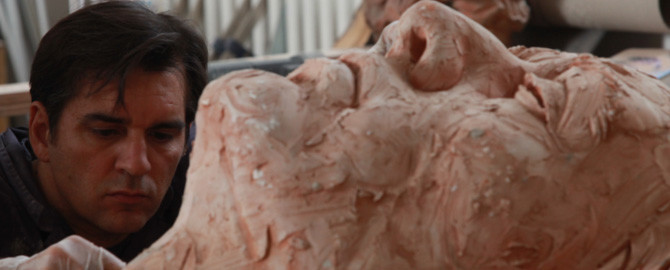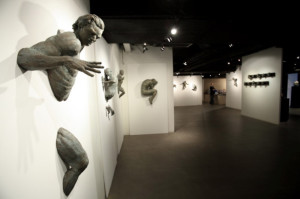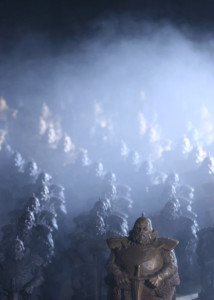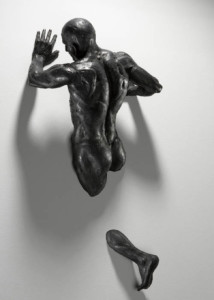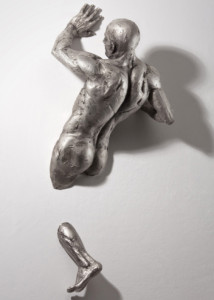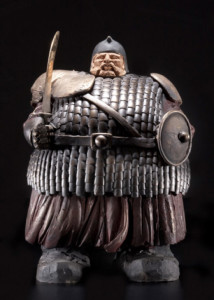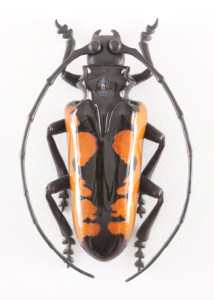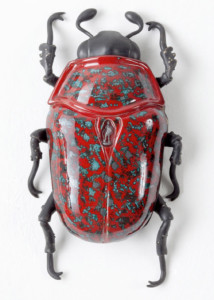Beautifully composed and sculpted by Italian Matteo Pugliese’s sculptures are wonderful configurations of the human body. They are pieces that continuously push, writhe and struggle in emptiness. It’s uncertain whether the sculptures are being sucked into some void or if they are breaking free. Regardless, Pugliese makes space seem closed and imprisoned; despite the aesthetic presence, his fragmented sculptures are contorted, uncomfortable and somewhat sorrowful.
Despite the influences of the likes of Bacon and Viola, Pugliese also naturally draws inspiration from the deep and rich history of Italian art and the infamous artists. However, his pieces have a contemporary and current kick that do unnerve, unbalancing the observer.
Today his works are on permanent display in galleries in Italy and major cities throughout the world, Rome, Hong Kong, London, Brussels, Lugano and TheHague and have been shown at some of the most important Italian and international art fairs such as the Hong Kong Art Fair (Hong Kong), ArtFirst (Bologna), Miart (Milan), Arco (Madrid), and Fiac (Paris).
Matteo Pugliese will be exhibtinig in January 2014 in Singapore, then later in the year March/April in the Kwai Fung hin Art Gallery, Hong Kong. Matteo Pugliese
Beautifully composed and sculpted, Italian Matteo Pugliese’s sculptures are wonderful configurations of the human body. They are pieces that continuously push, writhe and struggle in emptiness. It’s uncertain whether the sculptures are being sucked into some void or if they are trying to break free. Regardless, Pugliese makes space seem closed and imprisoned; despite the aesthetic presence, his fragmented sculptures are contorted, uncomfortable and somewhat sorrowful.
Further, and notwithstanding the influence of artists such as Bacon and Viola, Pugliese also naturally draws inspiration from the deep and rich history of Italian art and the infamous artists. However, his pieces have a contemporary and current kick that do unnerve, unbalancing the observer.
Today, his works are on permanent display in galleries in Italy and other major cities throughout the world: Hong Kong, London, Brussels, Lugano and The Hague. They have also been shown at some of the most important Italian and international art fairs, such as the Hong Kong Art Fair (Hong Kong), ArtFirst (Bologna), Miart (Milan), Arco (Madrid), and Fiac (Paris).
Matteo Pugliese will be exhibting in January 2014 in Singapore, then later in the year (March/April) in the Kwai Fung Hin Art Gallery, Hong Kong.
In his own words:
Please tell us more about your art and design background and when you first realised that you are an artist?
I’ve had a passion for sculpture and drawing since I was very young, and I spent so many years on practising just because it came naturally and it was a pleasure for me. Honestly in the beginning I never thought “yeah, I am gonna be an artist!”
I always worked (or “play” maybe?) with clay for myself, for pleasure or need. There aren’t any other artists in my family and the mantra was “You can’t make a living as an artist, find a real job”… So the harder step of my career was to leave this point of view and this way of thinking.
It has been the most important choice for my career indeed, and the harder one!
Concerning when I realized to be an artist, I should say it was about 15 years ago, when a friend of mine proposed me to organize my first exhibition. We did it and the day of the opening and the weeks after I started thinking: ”It can be real”.
You are well known for sculpture. Why did you specialise in sculpture and do you use other disciplines such as drawing in your process? If so how?
I did specialize in sculpture because, as I said, it comes naturally to me and it is just the easiest and more comfortable way to express myself. It’s quite funny because my studies, my environment, my friends and family…nothing was linked with sculpture. I should say that it is the sculpture that chose me…
I don’t use drawing in the process of sculpting. I seldom make some sketches but mostly I start working directly on clay and then I let the idea drive my movements. I try to leave myself malleable, ready to re-set the initial idea.
I am an observer who tries to notice what’s interesting while modeling the clay: the sudden or unexpected position of a shoulder or a muscle, an expression of a face, etc; and from there I go on working and “build” the sculpture. I like to imagine this process as a spiral wiring up towards an unknown direction, often quite different from the initial idea.
You have created public installations and commissions. How do you see and understand public space and the role of art in public space in today’s society?
It’s a very interesting question but too difficult to complete in a few words…It is a completely new field, I have to admit, for several reason: the scale (usually much bigger), the interaction with unusual space elements (compared with a gallery or a museum of course…) such as buildings, gardens, other monuments etc.
I think we should talk of “balance”, synergy, rhythm amongst these several elements.
Obviously the figure has been a huge muse for many artists throughout the history or art. What artists or professionals have been your biggest influences?
Masters and references change in time, and this is right. They change in connection with your feelings, your moods, your period of life. During my university years, Egon Schiele was my one and only reference, and I kept him for years. Perhaps his art was more in tune with my deepest soul, my inner past. After that I came to admire and study a bit of everything: from Classic Greek to Renaissance and beyond: obviously Michelangelo, Canova, Bernini, Rodin…
I strongly believe, however, that my influence derives more from other artistic fields rather than mere sculpture, such as music, movies, literature. I owe Rodin big time, but also Kurosawa, Schiele as much as Calatrava, Bacon, Bill Viola and Chuck Close.
What obstacles do you face in making and exhibiting your work?
I wouldn’t use the term “obstacle”: there are some elements that you need to help and run together. For example some sculptures weigh 300/ 500 kilos and obviously you need to organize yourself in a good way to place them. However, usually you see all the “obstacles” soon enough, so…. The most common problem is matching the different opinions of the people involved in the exhibition (including me, of course). Recently I spent days to define how and where to display some sculptures for an exhibition; the idea of lighting and the rhythm and distance among the works was completely different between me and the Foundation boss…so finally, like most of the times, the walls of the mind are higher and stronger than the real walls.
Your work is beautifully composed, modernistic with delicate use of materials. They do, however, have an old classical ‘feel’ to the form. Why have you fused the two together? Has this been a conscious decision in the development of your work?
It is not a conscious decision at all. I think that thanks to my Italian DNA I am soaked/permeated by centuries of classical art, like everybody else. Then I try to express myself – a man of the twenty-first century- and the two elements naturally collide, without a planned project.
Where do you see yourself in 10 years?
I don’t care where I will be in 10 years, the important thing is to keep doing what I love.
Born in Milan, Italy in 1969, and raised in Sardinia, Matteo Pugliese graduated from Milan University majoring in Modern Literature. During his time at university, he made sculptures and models of film and comic strip characters for his own pleasure. He now lives in Milan. Matteo is married with a daughter.
All images courtesy of Matteo Pugliese | www.matteopugliese.com
For more information on Hong Kong Art Tutoring please contact:
Gail Deayton
Telephone: +852 9722 8353
Email: gail@hkarttutoring.com

